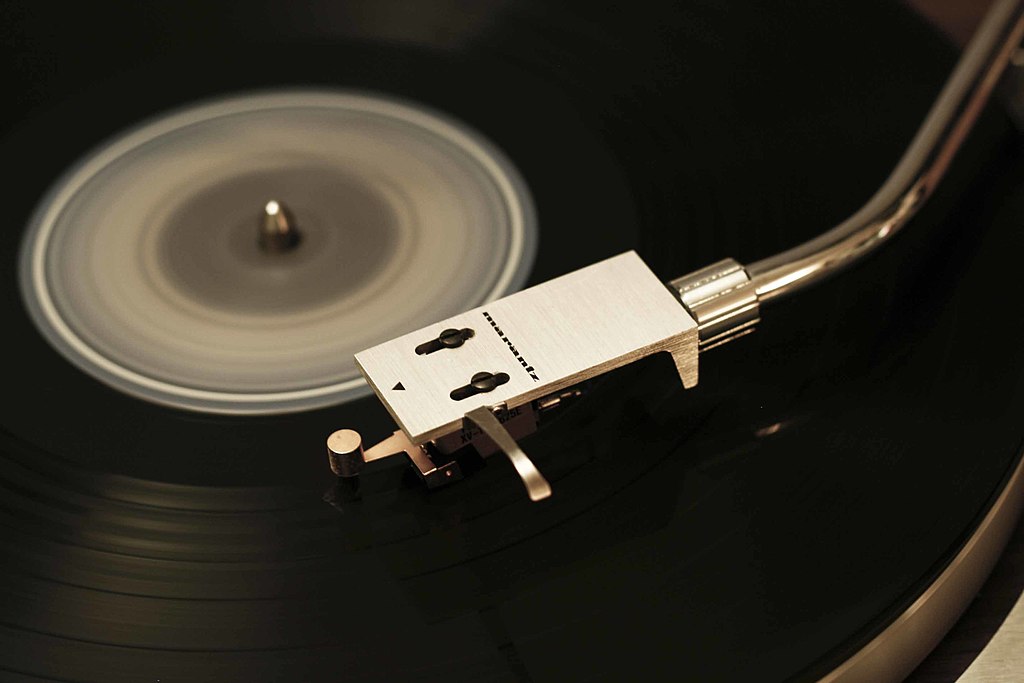
Marantz turntable, closeup on headshell by Paul Joseph, CC BY 2.0
As surprising as it seems one of my interests is visual art. In fact I minored in it in my bachelor degree (approximately 3 rotator cuff tears, 2 strained ACLs, and a mountain of debt ago). I remember in my first art history course the lecturer strode onto stage and boldly proclaimed, “Nothing is created in a vacuum, every song, story, painting, and sculpture ever created was influenced by what came before it.” Admittedly at the time I didn’t fully understand what the professor meant by this (it was an 8:30AM class and I was very tired), but the implications of the statement bear a great deal of significance in our understanding the disagreements around the use of AI in creative and academic spaces.
As I’ve read more about the ethical implications of artificial intelligence two common themes have persisted: ownership and citation. Essentially, those who are concerned about generative AI are 1) worried that the unauthorized use of their work to train AI models puts their livelihood in jeopardy as they’ve not been fairly compensated and 2) they have not been properly credited or recognized. Let me be clear that these are valid concerns. I cannot imagine the world twenty years into the future. Much like the invention of the camera reduced the need for portraiture, there is no way to say what will happen to our current crop of artisans in an AI enabled landscape.
However, these two arguments against AI are more complicated than they initially seem. At its heart AI is automating what artists have been doing for centuries: remixing. As Kirby Ferguson once eloquently stated, “When I say remix, I basically mean you’re making new stuff out of old stuff.” Further to this he challenged the idea that any work is truly original; in his mind everything to some degree or another is a remixing of what came before it. The latter point, while simple, is extremely powerful. As Kirby recognizes (echoing my art history professor) ideas and innovation do not occur out in the emptiness of space. Every artist worried about AI “stealing” their work has built upon the creations that came before them, often without exhaustive citation or credit. This tendency to imitate and emulate those we admire is invisible to us, however when a a machine does it we feel violated.
As Kirby explains this has roots in our conceptions of human creativity – initially creativity was the “channeling” of the divine’s will through us. It was not the artist that was responsible, but a higher power. Kirby notes that while this idea diminished during romanticism, its influence on our conception of creativity (the magical spark of brilliance and innovation) is still felt to this day. There are interesting parallels between the god/creativity argument and the current AI debate. We dogmatically believe that creativity can only originate from people. Humans are creative due to our innate intentionality, so all generative AI is mere random iteration on existing creativity. There is merit to this argument (generative AI is not ‘true AI’), but the attitude toward remix cannot be ignored. No one is truly original: as Kirby puts it we are constantly referencing cultural norms, transforming existing works, and combining it with disparate elements. We need to recognize that AI is a tool that accelerates what we have already been engaged with for ages.
I do not want to give the impression that artists are not justified in their concerns and anger over the use of machine learning and AI. These authors and artists and authors have dedicated a lifetime to their craft. As Laurence Lessig argued in his book Remix: Making Art and Commerce Thrive in a Hybrid Economy technology has encroached on the creative endeavors of professional artists. Filmmaking, music production, and the like were once the exclusive domains of those with access and training. Now anyone can produce music, create movies, or explore photography. It makes me wonder if the fear of generative AI is a result of the last barriers falling. Even with readily available (and sometimes free) digital tools it still took time to learn them. AI blows past this achieving in seconds what use to take years to master.
Does this mean the end of artists? Do we now pack in the towel? Since everything is continually repurposed is there any need for creators anymore? Lessig argues that amateurs using advanced tools do not eliminate the need for professionals, but instead grows the demand for new quality content. As he puts it fans creating and iterating on their favourite franchises makes them more valuable. He argues for less control of “amateur copyright” and for fair compensation when this crosses into the commercial domain. So if I ask AI to create a picture of my sister’s dog swinging around the town with Spider-Man it is fine (and increases the value of the brand), but if I want to sell the image or use it in a television commercial, then the artists whose work I remixed need to be compensated.
